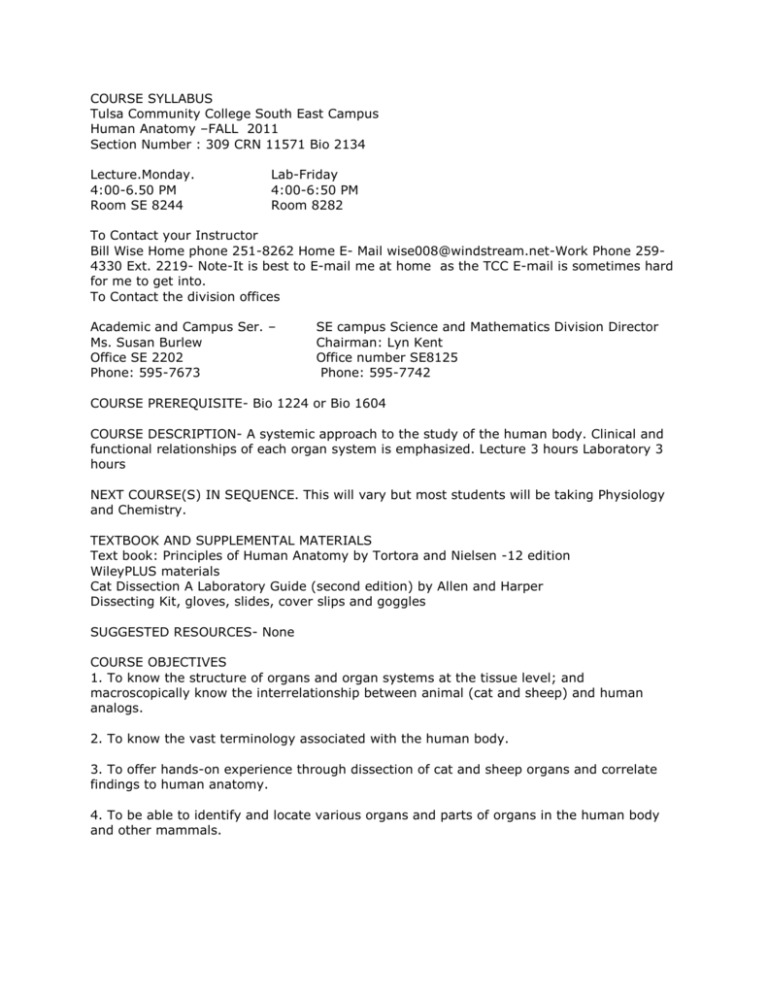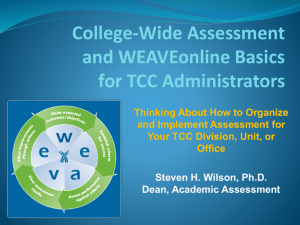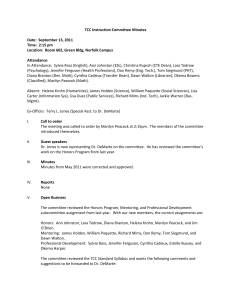COURSE SYLLABUS Tulsa Community College South East
advertisement

COURSE SYLLABUS
Tulsa Community College South East Campus
Human Anatomy –FALL 2011
Section Number : 309 CRN 11571 Bio 2134
Lecture.Monday.
4:00-6.50 PM
Room SE 8244
Lab-Friday
4:00-6:50 PM
Room 8282
To Contact your Instructor
Bill Wise Home phone 251-8262 Home E- Mail wise008@windstream.net-Work Phone 2594330 Ext. 2219- Note-It is best to E-mail me at home as the TCC E-mail is sometimes hard
for me to get into.
To Contact the division offices
Academic and Campus Ser. –
Ms. Susan Burlew
Office SE 2202
Phone: 595-7673
SE campus Science and Mathematics Division Director
Chairman: Lyn Kent
Office number SE8125
Phone: 595-7742
COURSE PREREQUISITE- Bio 1224 or Bio 1604
COURSE DESCRIPTION- A systemic approach to the study of the human body. Clinical and
functional relationships of each organ system is emphasized. Lecture 3 hours Laboratory 3
hours
NEXT COURSE(S) IN SEQUENCE. This will vary but most students will be taking Physiology
and Chemistry.
TEXTBOOK AND SUPPLEMENTAL MATERIALS
Text book: Principles of Human Anatomy by Tortora and Nielsen -12 edition
WileyPLUS materials
Cat Dissection A Laboratory Guide (second edition) by Allen and Harper
Dissecting Kit, gloves, slides, cover slips and goggles
SUGGESTED RESOURCES- None
COURSE OBJECTIVES
1. To know the structure of organs and organ systems at the tissue level; and
macroscopically know the interrelationship between animal (cat and sheep) and human
analogs.
2. To know the vast terminology associated with the human body.
3. To offer hands-on experience through dissection of cat and sheep organs and correlate
findings to human anatomy.
4. To be able to identify and locate various organs and parts of organs in the human body
and other mammals.
TEACHING METHODS
Lecture/Laboratory: This course is divided into one three hour lecture and one three hour
laboratory per week.
The method of instruction will be primarily lecture, using assigned reading materials.
Lecture may be supplemented by videos, slides, and whatever else becomes necessary.
Laboratory exercises will be used to enhance and offer “hands-on” experience for much of
the material covered in class.
Refer to syllabus for tentative scheduling of assignments and exams.
Course Withdrawal: The deadline to withdraw from a course shall not exceed
3/4 the duration of any class. Check the TCC Academic Calendar for the
deadline that applies to the course(s). Begin the process with a
discussion with the faculty member assigned to the course. Contact the
Advisement Office at any TCC campus to initiate withdrawal from a course
('W' grade) or to change from Credit to Audit. Withdrawal and/or change
to an audit from a course after the drop/add period can alter the
financial aid award for the current and future semesters. Students may
receive an outstanding bill from TCC if the recalculation leaves a
balance due to TCC. Students who stop participating in the course and
fail to withdraw may receive a course grade of “F,” which may have
financial aid consequences for the student.
COMMUNICATIONS:
Email: All TCC students receive a designated “MyTCC” email address (ex:
jane.doe@mail.tulsacc.edu). All communications to you about TCC and course assignments
will be sent to your MyTCC email address; and you may use MyTCC email to send email to,
and receive email from, the instructor regarding this course. It is usually easier though to
send E-mail by my home E-mail address.
Inclement Weather: TCC rarely closes. If extreme weather conditions or emergency
situations arise, TCC always gives cancellation notices to radio and television stations. This
information is also posted on the TCC website (www.tulsacc.edu).
GENERAL EDUCATION GOALS: General Education courses at TCC ensure that our graduates
gain skills, knowledge, and abilities that comprise a common foundation for their higher
education and a backdrop for their work and personal lives. TCC’s General Education goals
are: Critical Thinking, Effective Communication, Engaged Learning, and Technological
Proficiency.
CLASSROOM ETIQUETTE: Open and mutually respectful communication of varied opinions,
beliefs, and perspectives during classroom or online discussion encourages the free
exchange of ideas that is essential to higher learning and to the ability to learn from each
other. Use of any electronic device is at the discretion of the instructor.
SYLLABUS CHANGES: Occasionally, changes to the syllabus may be necessary. Students will
be notified of any changes to the syllabus by E-mail, during class or by writing.
STUDENTS WITH DISABILITIES: TCC provides accommodations for qualifying students in
compliance with the Americans with Disabilities Act. For information, students may contact
the disabled Student Resource Center, 918-595-7115, or the Resource Center for the Deaf
and Hard of Hearing, 918-595-7428V, 918-595-7434TTY.
ACADEMIC DISHONESTY: Academic dishonesty (cheating) is defined as the deception of
others about one’s own work or about the work of another. Academic dishonesty or
misconduct is not condoned or tolerated at campuses within the Tulsa Community College
system. Tulsa Community College adopts a policy delegating certain forms of authority for
disciplinary action to the faculty. Such disciplinary actions delegated to the faculty include,
but are not limited to, the dismissal of disrespectful or disorderly students from classes. In
the case of academic dishonesty a faculty member may:
§ Require the student to redo an assignment or test, or require the student to complete a
substitute assignment or test;
§ Record a "zero" for the assignment or test in question;
§ Recommend to the student that the student withdraw from the class, or administratively
withdraw the student from the class;
§ Record a grade of "F" for the student at the end of the semester. Faculty may request that
disciplinary action be taken against a student at the administrative level by submitting such
a request to the Dean of Student Services.
No Cell phones, Ipods, or other such devices are allowed to be out
on a test day. Having these out could result in a zero on the test
INSTITUTIONAL STATEMENT: Each student is responsible for being aware of the information
contained in the TCC Catalog, the TCC Student Policies & Resources Handbook, and
semester information listed in the class schedule. All information may be viewed on the TCC
website: www.tulsacc.edu
EVALUATION TECHNIQUE
Three unit tests of 125 points each Total 375 points
Lab work and lab quizzes
Total 250 points more or less
WileyPLUS assignment
Total 100 points more or less
Two Lab tests of 100 points each
Total 200 points
Last unit test and final test
Total 225 points
Course total around 1200 or more points
100% -90% = A 89%-80% = B 79%-70% = C 69%-60% = D 59%-50% = F
The unit tests will be given during the first part of the lecture. Please remember that this is
a three hour period and you will not be released for the remainder of the day.
We cannot afford to lose 1/2 of the class lecture period due to testing. Those who leave
after a unit test will be counted absent for at least 1/2 of the period.
Lab Tests usually will start at 4:30 to 4:45 PM on the lab day. Everyone needs to start at
the same time. Points may be taken off if you come in late. You may get a zero if you are
over 15 minutes late.
MAKE-UP AND LATE ASSIGNMENT POLICY
Laboratory tests and quizzes usually cannot be made up.
Unit Tests may be made up if arrangements are made with the instructor prior to the test.
Only one week will be granted to make up unit tests. Usually make up tests will be taken in
the Laboratory room.
After grades are posted on Black Board, students will have 8 days to challenge a grade.
After that time the grade will stand as posted. Therefore you need to check your grades at
least once a week.
ATTENDANCE POLICY
The lecture period is three hours long. Sometimes I have students that like to leave for the
last hour or miss the first hour; those people will be counted absent for at least 1/2 of a
day. This is especially true on test days. You will need to come to class after we take a unit
test. We can not afford to miss 1/2 of a period. The likelihood of succeeding in this course
with out your attendance is minimal. Some of the material covered in the labs and lecture
may not be covered in the textbook. The student is still responsible for all material and
announcements made during the lecture period. Information missed must be obtained from
classmates, not the instructor. Excessive absences should result in administrative withdraw.
Sometimes I offer extra credit or bonus points, however; no extra credit will be counted for
students who have excessive absences and full credit, on extra credit, will only be given to
students with one or zero absences in lecture and laboratory classes combined. Grades can
be lowered because of lack of attendance. For instance extra credit may be given for labs
that we are not able to cover in the lab period. This extra credit will not be given unless all
other lab assignments are completed. Each extra lab is worth 4 points for 0 or 1 absent, 3
points for 2 absences, 2 points for 3 absences, 1 point for 4 absences and none for over 4
absences. Being gone for the second half of a test day will count as one absence. These
Extra credit assignments need to be completed in full. WILEY-Plus assignments do not
always require all questions in the lab book answered but for extra credit, all
questions in the lab book need to be answered.
NO copied or xeroxed work from a machine will count for extra
credit. In other words you can not copy a blank lab book and fill it
in.
LEARNING SUPPORT SERVICES
Check with counselor.
PLAGIARISM POLICY
Plagiarism is claiming, indicating, or implying that the ideas, sentences, or words of another
writer are your own; it includes having another writer do work claimed to be your own,
copying the work of another and presenting it as your own, or following the work of another
as a guide to ideas and expression that are then presented as your own. The student should
review the relevant sections of the TCC Student Code of Conduct Policy Handbook.
Plagiarism almost always results in an F grade on that material.
COMPUTER SERVICES ACCEPTABLE USE
Access to computing resources is a privilege granted to all TCC faculty, staff, and students.
Use of TCC computing resources is limited to purposes related to the College’s mission of
education, research, and community service. Student use of technology is governed by the
Computer Services Acceptable Use Statements/Standards found in the TCC Student code of
Conduct Policy Handbook. These handbooks may be obtained by contacting any Student
Activities or Dean of Student Services office
NO FOOD OR DRINK IS TO BE TAKEN INTO THE LAB ROOM. Please answer cell phones out
side of the classroom. Remember it is you responsibility to clean up after yourself and grade
may be lowered in lab because of leaving dirty areas or improper use and storage of the
microscope.
ADA POLICY
STUDENTS WITH SPECIAL NEEDS: Students with documented disabilities are provided
academic accommodations the disABLED Student Resource Center (918-595-7115) or
Resource Center for the Deaf and Hard of Hearing (918-595-7428/TDD- TTY 981-5957434). If any student is in need of academic accommodations from either office, it is the
student’s responsibility to advise the instructor so an appropriate referral can be made no
later than the first week of class. Students may also contact the disABLED Student Services
Offices directly at the telephone numbers listed. ACADEMIC ACCOMMODATIONS WILL NOT
BE PROVIDED UNLESS APPROPRIATE DOCUMENTATION IS PROVIDED TO THE DISABLED
STUDENT SERVICES OFFICES TO SUPPORT THE NEED.
Tentative Schedule-This is only tentative and could be subject to change due to a
number of factors
Week number
Lecture topic
Lab assignment
1 st week Aug 22
Intro & Chap 1
Introduction, safety & Watch video- The Universe Within
2nd week Aug 29
Chap 2Body regions, Planes of reference, directional terms &
microscope
3rd week Sept. 5
Chap 3 & 4
Microscope quiz-start Histology
4th week Sept. 12
Chap 5 & 6
Histology quiz- start axial skeleton
5th week Sept 19
Unit test chap1-6
Quiz-axial Skeleton and start appendicular skeleton
(125 points)
Start chap 7
6th week Sept 26
Chap 7 & 8
App. Skel quiz and start muscles
start cat muscles-skin cat-dis. 1 cat book
7th week Oct. 3
chap.8 -9
Wiley catch up day and Surface anatomy
Work done at home.
8th week Oct 10
9th week Oct 17
Chap. 10-12
2nd unit test
Start chap 13
human muscle quiz and review for lab practical
1st lab Practical (100) points
10th Week Oct 24
chap 13, 14,15
11th week Oct 31
Finish 16-18
12th week Nov 7
Chap 19-22
13th week Nov. 14
14 week Nov 21
unit test-chap 13-22
125 points
Start chap 23 & 24
Chap 25-
15th week Nov 28
Chap 26 & 27 -
16th week Dec 5
17th week Dec 12
Finish chap 27-Video
Final test- chap 23-27
and compressive
225 points
Cat muscle quiz-Study cat nerves and main cat organs
Cat dissection 2 -dissect eye
cat quiz main organs
-Look at cat glands-cat dissection 3
Dissect heart-cat dissection 4
Dissect brain- quiz on heart
Study main cat organs-circulatory system
cat book – cat dissection 5,6 & 7
Quiz on glass cat-and quiz on brain
Thanksgiving
cat dis. 8 review for lab practical-Wiley finish day
Final cat quiz and cat dissection completion.
Final lab practical -100 pts






